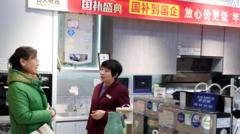Amid economic stagnation, China expands its consumer goods trade-in program to include kitchen appliances, offering discounts in hopes of spurring consumption. However, experts question the effectiveness of these measures in generating wider economic growth.
China Enhances Appliance Trade-In Program to Revitalize Economy

China Enhances Appliance Trade-In Program to Revitalize Economy
The Chinese government expands its trade-in initiative for kitchen appliances as part of an effort to stimulate its slowing economy amid rising challenges.
China's economic landscape has encountered significant hurdles in recent years, prompting the government to explore new avenues to boost consumer spending. In a recent move, officials have broadened the scope of a consumer goods trade-in program, allowing citizens to swap old kitchen appliances like microwave ovens, dishwashers, rice cookers, and water purifiers for discounts of up to 20% on new purchases.
Previously, this state-backed initiative included electronics such as televisions, smartphones, tablets, smartwatches, as well as electric and hybrid vehicles. Now, with the inclusion of essential home appliances, the government aims to further stimulate the economy.
Officials announced this week that approximately 81 billion yuan (£8.9bn; $11bn) has been allocated for the scheme this year, which was launched in March. The National Development and Reform Commission (NDRC) claimed these trade-in schemes have already demonstrated "visible effects," in boosting sales of major items, particularly home appliances and cars.
However, skepticism persists among economists regarding the overall effectiveness of such schemes. Dan Wang, an economist based in China, noted that the measures are insufficient to catalyze a robust increase in consumption. Harry Murphy Cruise from Moody's Analytics echoed this sentiment, remarking, “While it has supported sales of some listed goods, such as cars and appliances, it hasn’t driven an overall uptick in spending.”
Amidst these developments, the Chinese government has been proactive in implementing additional measures to support its domestic economy, as exports face growing challenges. During a key leadership meeting in December, there was a strong reiteration of the importance of "vigorous" efforts aimed at enhancing consumer expenditure. This comes against a backdrop of rising international pressures, particularly with President-elect Donald Trump preparing to implement significant tariffs on Chinese products.
Next week, China is poised to unveil its 2024 economic growth figures, with projections indicating an anticipated growth rate of around 5%, amidst the ongoing quest to navigate through its economic challenges.





















